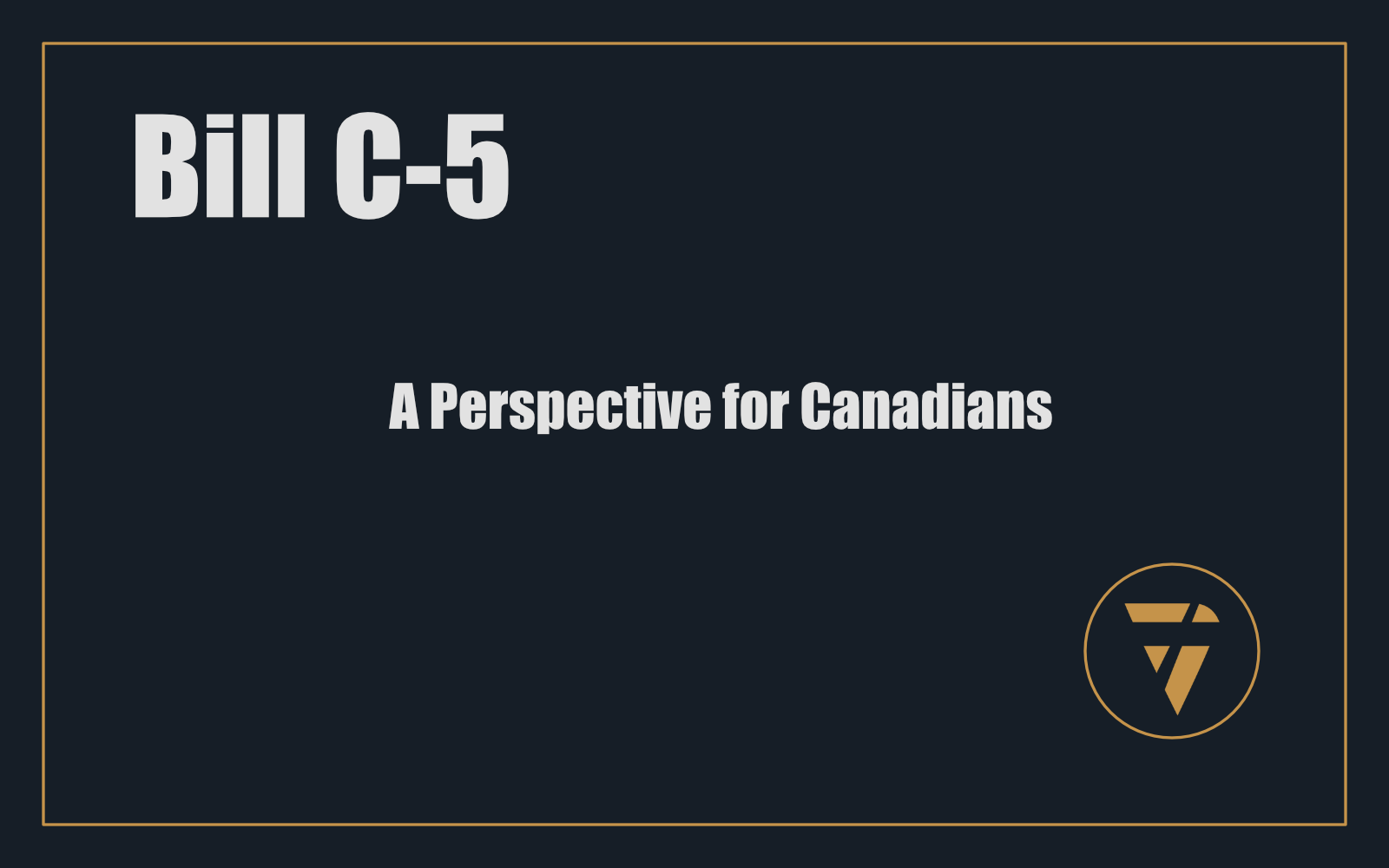Bill C-5

A Perspective for Canadians

A Letter to Every Canadian Who Wants to Understand What's Really Happening
and a reminder... this is just what I see. I appreciate a different analysis if you want to share it.
Many of you have asked for someone to explain Bill C-5 without fear-mongering - to show you the exact problematic wording and explain why it matters. You deserve that honest explanation. As Canadians who care about understanding what our government is doing, you represent the best of our democratic traditions.
I wish I could learn about what our govt is doing w/o all the fear mongering. If there is something bad, explain why it is bad, don’t just scream they are doing the bad thing, and that makes them evil. Not all of us are political geniuses, and I’m not gonna read your shit if all you do is yell.
— Brandy with a why? 🍁 (@brandywithawhy.bsky.social) 2025-06-17T16:42:45.049Z
The preamble sounds reassuring. It talks about respecting Indigenous rights, protecting the environment, and working in partnership. But here's what every Canadian needs to understand: in law, the preamble is like a greeting card... it sets a nice tone.
The real power lies in the specific sections that follow, and those sections tell a very different story.
Part 1: The Specific Problematic Provisions
Section 21: Power to Change What Laws Apply
Exact text: "The Governor in Council may make regulations adding, amending or deleting provisions in Schedule 2"
What this means: The federal Cabinet can change which laws apply to major projects without going back to Parliament. Schedule 2 lists critical environmental laws like the Fisheries Act, Species at Risk Act, and Canadian Environmental Protection Act.
Why it's concerning: This gives Cabinet unlimited power to decide which environmental protections apply to projects they want to fast-track.
Section 22: Power to Exempt Projects from Any Law
Exact text: "The Governor in Council may, on the recommendation of the minister responsible for an enactment, make regulations
(a) exempting one or more national interest projects from the application of any provision of that enactment or any provision of regulations made under that enactment; and
(b) varying the application of any provision of that enactment or its regulations to a national interest project"
What this means: Cabinet can completely exempt any "national interest project" from any federal law or regulation, or change how those laws apply.
Why it's concerning: This is essentially unlimited power to override any law Parliament has passed - environmental protection, Indigenous rights, safety regulations, anything.
Section 23: Power to Exempt Projects from Bill C-5 Itself
Exact text: Similar to Section 22, but allows Cabinet to exempt national interest projects from provisions of Bill C-5 itself.
Why it's concerning: The government can even exempt projects from the few safeguards that exist within their own bill.
Section 6: The "Automatic Yes" Problem
Exact text: "All determinations, findings and opinions necessary for granting of required authorizations are deemed to be in favour of permitting the project to be carried out"
What this means: Once a project is designated as "national interest," every decision needed to approve it is automatically considered to be "yes" - before any assessment happens.
Why it's concerning: This flips environmental assessment from "should we approve this?" to "what conditions should we put on this already-approved project?"
Section 19: Gutting Environmental Assessment
What it does: If a project is both a "national interest project" and subject to the Impact Assessment Act, it skips the planning phase of environmental assessment.
Why this matters: The planning phase is when potential problems are identified early. Skipping it makes environmental disasters more likely and increases the chance of expensive court challenges later.
Part 2: What Makes Canada, Canada?
Before we go deeper, let's remember what we're trying to protect. Canada isn't just geography - it's an idea built on:
- Indigenous peoples' rights as the foundation of our legal system
- Environmental protection ensuring this land remains livable for our children
- Democratic institutions that keep power accountable to the people
- The rule of law meaning no one, not even government, is above the law
- Federalism ensuring both national unity and regional diversity
Bill C-5 threatens every single one of these Canadian values.
Part 3: The Constitutional Crisis
The Indigenous Rights Violation
Canada's Constitution Section 35 recognizes and affirms Indigenous rights. The Supreme Court has spent decades defining this: free, prior, and informed consent for projects affecting Indigenous territories, not just consultation.
The problem with Bill C-5:
- Limited consultation requirements: Minister must "consult with Indigenous peoples whose rights may be adversely affected"
- What's missing: No requirement for consent, no definition of what "consultation" means, no timeline requirements
- Section 22 powers can exempt projects from provisions of the Indian Act and other legislation that protects treaty rights
- No constitutional protection: Nothing explicitly protects Section 35 constitutional rights
The Democracy Deficit
Our system has checks and balances for a reason. Bill C-5 short-circuits all of them:
- No meaningful parliamentary oversight - Cabinet makes major decisions through regulations
- No requirement for public hearings on specific projects
- No court review of ministerial decisions until after damage is done
- Minimal Indigenous consultation with no requirement for consent
- Secret decision-making - no requirement to publish reasons for designating projects
Part 4: The Environmental Betrayal
Canada's environmental laws protect the waters that sustain our communities, ensure we don't destroy irreplaceable species, and help us understand consequences before we commit to major projects.
What laws could be overridden:
- Fisheries Act (protects fish habitat)
- Species at Risk Act (protects endangered species)
- Canadian Environmental Protection Act (pollution controls)
- Impact Assessment Act (environmental assessments)
- Migratory Birds Convention Act (protects migratory birds)
- Canadian Navigable Waters Act (protects waterways)
Sections 21, 22, and 23 give Cabinet power to exempt any "national interest project" from any or all of these laws. Not modify them, not streamline them - exempt projects entirely.
Part 5: The Rush to Judgment
In the Senate conversations that sparked this analysis, Senator Paula Simons revealed: "We are under immense pressure to pass the bill, unamended, by the end of next week."
We are under immense pressure to pass the bill, unamended, by the end of next week. We will have to see what happens next.
— Senator Paula Simons 🇨🇦 (@senatorpaulasimons.bsky.social) 2025-06-18T00:24:39.845Z
This is exactly backwards from how democracy should work. As one citizen noted: "any unconstitutional bill can be run through just by saying 'we're in a hurry.'"
The government is using urgency to bypass proper legislative review, just as the bill will use "national interest" to bypass proper environmental and constitutional review.
Part 6: What This Means for You
If you live near a proposed project:
You might have no opportunity for input before it's approved. Environmental protections could be waived entirely.
If you fish, hunt, or enjoy the outdoors:
Habitat protections that maintain healthy ecosystems could be suspended for any project Cabinet deems important.
If you're Indigenous:
Your constitutionally protected rights could be reduced to a checkbox exercise where consultation happens but consent isn't required.
anyone else catch the ...binders dropped from planes for "indigenous notification???"
If you care about democracy:
Major decisions affecting your community could be made behind closed doors with no way to hold decision-makers accountable.
Part 7: The Economic Reality Check
The government claims this is necessary for economic competitiveness. But:
- Proper environmental assessment doesn't significantly delay projects - research shows other factors cause most delays
- Cutting corners creates more delays - projects end up in court for years
- Canada's reputation matters - our resources command premium prices partly because the world trusts our standards
Part 8: What You Can Do
Immediate Actions:
- Contact senators directly - write in your own words about Canadian values and why this bill threatens them
- Learn about specific projects that might be designated "national interest"
- Demand public consultation before any project goes on the list
Take a moment to thank Senator Simons. Really. It takes effort and time to participate in these conversations. The job is intense, and the work is immense. Thank you, Senator.

Longer Term:
- Support organizations challenging this bill if it passes
- Remember this in elections - politicians supporting this need consequences
- Stay engaged - democracy requires citizens who care enough to participate
Part 9: The Choice Before Us
This isn't about stopping development. Other countries build major infrastructure while respecting Indigenous rights and environmental laws. Norway built extensive oil infrastructure with strong environmental standards. New Zealand streamlined approvals while strengthening Indigenous co-management.
The choice isn't between Bill C-5 and no development. The choice is between reckless development that cuts corners and sustainable development that builds for the long term.
Standing for Canada
Canada faces real challenges - climate change, economic competitiveness, reconciliation, national unity. These require serious solutions, not shortcuts that create bigger problems.
Bill C-5 isn't a solution - it's an abdication of the hard work democracy requires. It chooses short-term convenience over long-term responsibility.
The bottom line: Bill C-5 gives federal Cabinet unprecedented power to override virtually any law Parliament has passed, with minimal oversight, consultation, or accountability. While the preamble promises to respect rights and protection, the actual legal text provides mechanisms to bypass these protections entirely.
This represents a fundamental shift away from the values that make Canada worth protecting. Not because it's "evil," but because it chooses convenience over the careful balancing that makes Canada work.
The land we call Canada has been here for millennia. The Indigenous peoples who first called it home developed sustainable ways of living with it. The democratic institutions we've built represent humanity's best attempt to govern fairly and accountably.
Bill C-5 asks us to gamble all of that on the promise that giving government unlimited power will somehow make things better. That's not a bet any Canadian should make.
We can do better. We must do better. And it starts with citizens asking the right questions and demanding real answers.
Prepared by a concerned Canadian who believes we can build a better future without sacrificing the values that got us this far.
Our democracy depends on informed citizens.
This is what I’m working on. Tell me what you think, I enjoy the conversation! Subscribe and follow the work in real time.
Thanks!
B

They hid it in the fine print.
C-5 exempts “national interest” projects from Canada’s core environmental laws, treaty obligations, and public scrutiny.
This is legislative sleight-of-hand, not sober second thought.
PS -








